La Comedie des Erreurs
July 29, 2011
10:15 AM
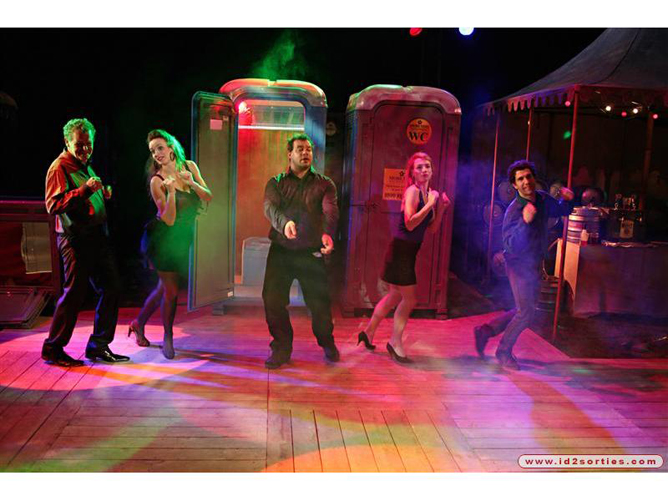
It has been such an interesting week.
The annual arts festival Les Nuits de la Terrasse et del Catet was on this week and one of the highlights for us was a production of the above Shakespearean play , in French, in the Domain d’Asties.
We had the techies staying with us , the lighting man, the sound man, the wardrobe mistress and the stage manager.
They were from what seems to be a very successful Swiss theatrical company, Theatre Vidy-Lausanne and were part of the touring company.
They have bee touring La Comedie for all of this year and they will take off again for another tour next year.
They have been everywhere , in France and Germany, Switzerland and Austria.
They have had a very successful run in Paris (I found reviews on the internet)
and interestingly the director is an Englishman, Dan Jemmet , who it seems, like Peter Brooke, fled to France for the better theatrical opportunities here.
Anyway they invited us to the production on Wednesday night and it was superb.
This is not the greatest of William S’s plays. He wrote it very young and it is a one joke comedy with an almost Gilbertian plot of twins who don’t know of each others existence.Not only that but two sets of twins.
We saw an extremely good production on the BBC ages ago but that had the advantage of having Judy Dench starring and I would happily pay to have her read the shipping forcast.
So we headed off, in some fear, on Wednesday, a bit unknown this, Shakespeare in French.
Well it was a triumph.
The set was four portaloos into and out of the cast disappeared with amazing rapidity, the cast was reduced to five acrobatic actors , who could with a ruffle of their hair transform themselves , there were two beer dispensers on stage which the cast tried valiantly to empty during the production. (the techies informed us at breakfast that it was, however, non-alcoholic.)
Great fun was had by all.
It was a sort of Feydeau, meets Mack Sennet, meets Monty Python production which was extremely true to the original but with loads of Eighties disco music and lighting and the audience just adored it.
The cast got a standing ovation at the end and were called back again and again for their bows.
It was terrific to be able to tell our lads (they are now all firm friends) how much we loved it- as for it being in French ? I don’t think either of us missed a joke.
The following night the lighting mans wife and children and mother-in-law arrived chez nous and so we fed them all a pre-production feast of Irish and Languedocean delicacies* and then, after the techies had departed to work, had a (pre-curfew) sing song with the Mamans and the Enfants of French Nursery Rhymes, and their English equivalents , au terrace until, goodness at least 10 30.
It is quite sad to see them all depart today.
* Menu for Irish Languedoc Repas:
La Tarte des Tomates et Chevre avec Basilic et Huile d’Olive.
Le Fillet de Porc , farci avec des Abricots et des Pignons, enveloppé en jambon fumé.
Les Fromages des Alpes et d’ Auvergne
La Glace au Thé et Whiskey sur un Flapjack des Avoines
Lost in Translation Seventy Three
July 27, 2011
17:40 PM
We have some people from Lausanne in Switzerland staying with us and I was just explaining to one how to get to tonights open air theatre.
It is, I told them, in Domaine d’Asties which is on Le Pech just across the valley from our house.
The word pech completely dumbfounded my Swiss friends , who were of course native French speakers and I remembered that it was a dialect word from around here.
A Pech I explained was a colline or little hill.
It always seemed a totally reasonable word to me as it must be related to Pic which means a mountain in the Pyrenees (see Pic Du Jer near Lourdes) and also Piquer in French which means to sting (as in my favourite white wine Picpoul which is meant to sting my lips ) and then also, in English, to peak , as in a peaked hat or the top of a mountain. It also reminds me , probably without reason of the Kerry word for mountain, the Reek and then the Scots and Irish Ben or Pin.
They all seem to me to be related in some way and I feel sure have a common Celtic origin.
3 comments
The Departure of the Castor Oil Plant
July 27, 2011
11:35 AM
Our neighbour M. Sanquery , has bought over the Cave Cooperative of the village which has been shut down since we first saw the place, it had apparently gone bust a few months before.
Now as our neighbour he had provided us with one of the great talking points of everyone who stood for the first time on our terrace.
Here is the original story from Easter of 2006 as blogged in September in 2008 :
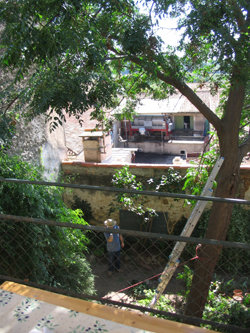
And this is the Castor Oil Plant.
(a small explanation is necessary)
My sister D was staying with us the first easter we were here when Síle spotted a large castor oil plant growing up the wall in front of the winery which is just in front of the house.
Aha! says Sile looking at the plant. “That’s a castor oil plant”
“Is it” says sister D, looking at the winery “I thought it was a wine making place”
Since then M. le Vinticulteur’s wine making area has been known as “The Castor Oil Plant”
It has always been without much activity but in September, we have discovered the place becomes a hive of activity.
A virtual cabaret in front of our eyes from our terrace.
Colm and I are having constant disagreements at what the machine, which seem very sophisticated, is actually doing.
The trouble was that the tree our Chinaberry tree, has grown enormously with the rains of June and our garden watering so its branches are virtually obscuring our daily show.
Yesterday Colm mended this by going up the tree with a ladder and saw and creating a proscinium arch for daily entertainments.
But back to the present.
M. Sanquery is of course moving his extremely valuable piece of equipment down to his new home in the Cave so last week , with a huge crane it went :
Up Up

and Away.
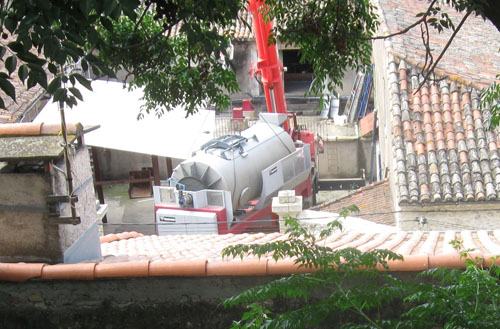
Will I miss it ?
Not for it’s beauty , nor its constant churning during the month of September, all day, every day.
But,
I will miss being able to tell the Castor Oil Plant joke .
Les Allemands
July 27, 2011
10:39 AM
We were at a dinner party here in the village last week and one of the couples there were a French woman, of our generation and her German husband.
As we all relaxed over dessert I asked them a question which is I suppose fairly indiscreet , but has been giving me much cause for thought lately.
I asked them why were Germans so well liked in this area.
Surely with the war so recent they, the oppressors, should still be regarded with some residual national loathing. Our obversion indicated to us that this was not the case and that the Thezanese now actually preferred the Germans to the English -their liberators.
Of course being south of Vichy the war was faught on different lines down here one of the principal causes for dissent in the Languedoc- the history books tell us- was the young men in the area being forced into service in Germany to work on agriculture and in factories left unmanned by German soldiers.
Anyway , the question caused no offence , and started a conversation which was very interestng.
The French lady , whose family originally came from Thezan , told us that her father was forced to go and work for the Germans , this left her mother with an abiding hatred of that race as she was forced to raise her family without him.
But, her father came back from his forced labour a man who had made great friends in Germany, had been treated exremely well while there and bore them no resentment whatsoever.
Her mother remained unmoved however and while she was growing up our friend was always instructed by her Mother to never marry a Boche.
The inevitable of course happened and , on holiday in St Tropez , she met her future husband .
He , it turned out was an extremely well brought up (and handsome ) young man , and insisted on asking her mother’s permission before asking her out.
At this all of of her Mother’s opposition melted and a few years later they were married.
So where are all these stories of collaborators, of shaven headed women carrying children being abused after the war by the villagers ? Of undying hatred for Germans held by the French after the atrocies of the war ?
As so many of the players in this scene are still alive, and it still is a subject never discussed here, I think it will be years when the real impact of WW 2 on the people of the south of France surfaces.
Festival del Catet
July 27, 2011
08:41 AM
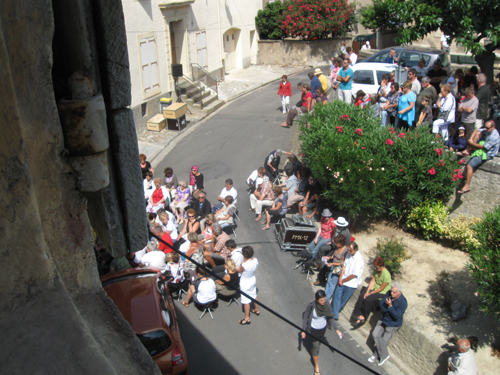
This years local arte festival is on at the moment , called Des Terraces et Del Catet it always starts with a concert in the lane next to our house.
This year we decided to take advantage of the crowd outside our door and put some cards on a table by our open front door and to open windows so people could look into the kitchen.
It worked a treat , and people (always men strangely) were coming up to the windows, cameras ready , taking (I presumed) pictures of our great display of petunias which Síle planted in the window boxes this year.
If thay caught my eye while taking their shots they always said , almost apologetically “Mais c’est si charmant !” or words to that effect.
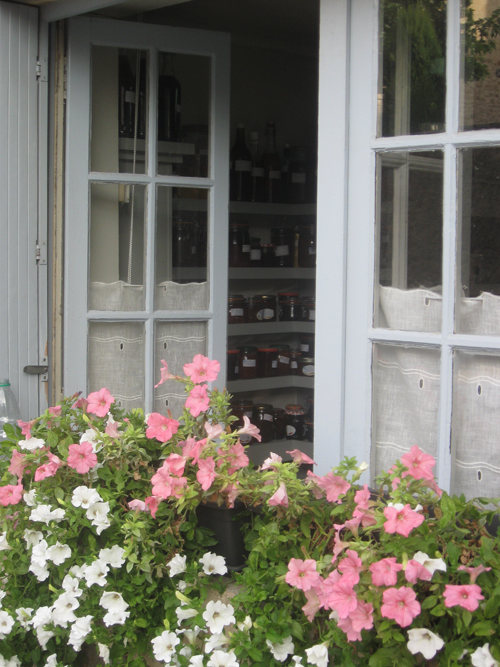
It was only last evening when I decided to replicate these gentlemen’s Si Charmant pictures that I realised that, from the angle their were shooting , it was not the flowers but the Jams they were capturing.
I should have guessed.
All French men’s eyes are (like mine) directly hot wired to their stomachs.
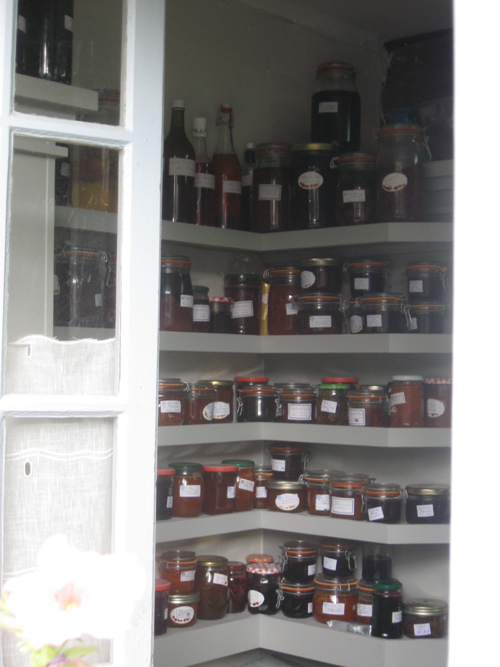
Clive’s Exhibition
July 26, 2011
07:43 AM
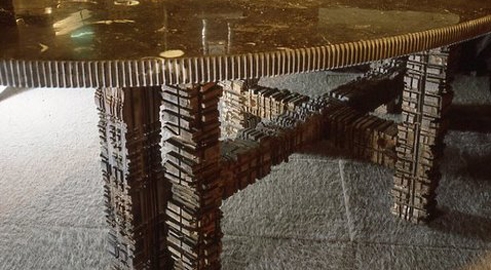
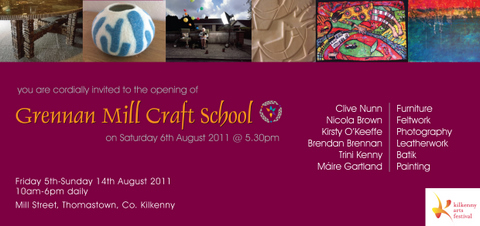
Clive Nunn , our old friend and the designer and ( for the most part ) maker of our beautiful Presbytere is having an exhibition of his life in furniture as part of Kilkenny Arts Week this August.
Clive has moved through so many fascinating life changes , from dealing in antiques, to restoring and being a champion of Irish vernacular furniture, to designing and making his own beautiful furniture to designing (in my case ) first restaurants and then whole houses .
This exhibition is one well worth travelling to.
It will be in the Grennan Mill Craft School in Thomastown from Friday August 5th until Sunday 14th from 10.00 to 6.00 daily.
Do not miss it.
1 comment.
Lost in Translation Seventy Two
July 25, 2011
08:59 AM
We are full at the moment with a theatre company from Switzerland who are putting on a production of La Comedie des Erreurs in the garden of the local big house.
We always serve Fromage Frais with our breakfast fruit and as I feared we might run out I dropped into our local shop to see if they stocked it (this shop is called Le Point Show , another reason to get lost in translation, as they used to stock Videos [show] and they are a hot bread shop [chaud])
As this is a shop with a counter, and the goods behind it -remember them ?- I asked Madame if she had some fromage frais.
Madame was obviously offended “Mais toutes mes fromages sont frais Monsieur !”
I quickly realised my mistake.
The soft fresh cheese which I serve here, we call fromage frais (literally fresh cheese) in Ireland , here, in the Languedoc, it is called Fromage Blanc.
I quickly corrected myself with madame and , mollified, she allowed me to buy some cheese for breakfast.
It does leave me with a very strange anomaly , why in Ireland do we call this cheese a different – but still French name ? And why is the French word for Cul-de-Sac :- Impasse ?
4 comments
My Favourite Coffee Maker
July 23, 2011
07:17 AM
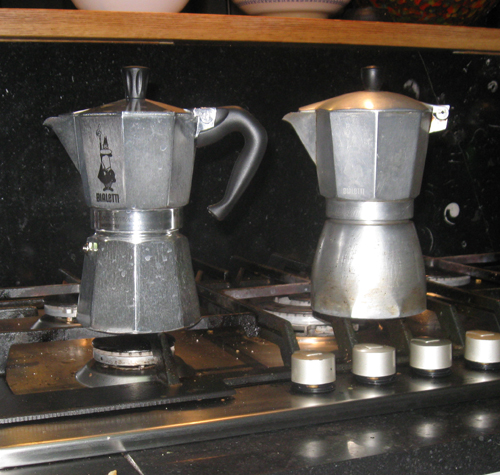
Above you see two coffee pots , second from the left is my original Espresso Coffee Maker , it is, I think about forty years old and has served me well.
It is indeed an espresso machine, despite the lack of shiny chrome , hissing steam valves or strange plastic capsules.
It is officially a six cup machine and it does indeed produce six miniscule thimblefuls of coffee , for me, first thing each morning, it produces one large comforting bowl- although I do confess that I don’t make this at full strength and I do add a little milk to the brew.
As I said it has served me well cince sometime early in the 1970’s , it has had a few changes of internal filters and suffered for a while when someone attempted to make coffee in it without putting water in the bottom tank.
(By about six weeks the taste of burnt coffee had completely disappeared)
The final straw happened when its bakelite handle seccumbed to old age and proved impossible to replace.
Since then we have been quietly searching for a replacement.
Now you will notice that the pot is made of aluminium, its kind have been made of aluminium for years , nowadays – we discovered as we searched for a replacement – they are made of stainless steel or some sort of coloured metal.
We felt that , as they are such a basic tool of French living that somewhere , in a village Quincaillerie * we would find one in aluminium.
And so it proved.
Two days ago we found one in the small village of Quillan in the Pyrenees-Oriental.
It is pictured with its predecessor above , byond a few very minor adjustments it is identical to the original. You can now wriggle the safety valve about to make sure it is not clogged by calcium and, of course being aluminium it will start its life being shiny until it soon reverts to matt grey.
For those of you who still harbour doubts about the relationship between that metal and Alzheimer’s , modern medical research would indicate that one cup of tea has more aluminium in it than we could possibly ingest from a year of boiling water in a pot made of this metal.
This morning Espresso Pot Mark two made me a bowl of perfect coffee.
* For the nerds among you who ( like myself) wondered where the French got the word quincaillerie a short consult with my Larousse , Grand Dictionnaire Étymologique , (but of course I have bought one ) the answer , most interestingly is that the shop originally sold iron ware and its name came , onomatopoeically , from the clanking (French clinquant) sounds of its wares.
1949, and all that.
July 20, 2011
06:58 AM
My life has a strange relationship with the ninth year of decades.
I was born in 1949 .
In 1969 I left home to study in UCD.
In 1979 we moved to Waterford and I started working in Ballinakill House.
In 1989 we opened, and moved into Dwyers Restaurant in Mary Street.
In 2009 we moved to France and started Le Presbytere.
Please, please let it be 2029, when the next career move happens
My Favourite Saucepan
July 18, 2011
08:36 AM
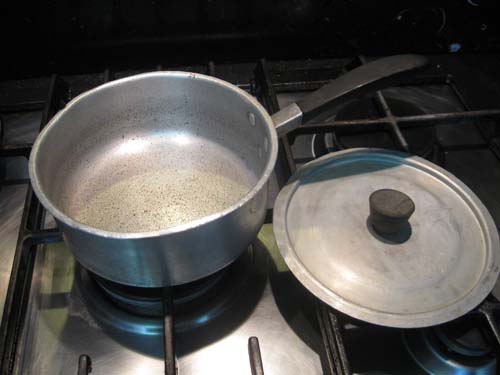
If this pan could speak it would surely have a tale to tell.
It was made by Castle Brand in Nenagh sometime in the forties or fifties . This makes it at least sixty years old.
Sixty years, furthermore of constant use.
It was originally designed as a milk saucepan and as such these were very common in a lot of Irish kitchens when I was a child.
They were also designed to be used on the “new” electric cookers which were becoming fashionable and taking over from gas ones.
Consequently they were made with an exceptionally thick base to accommodate these new fangled electric black solid radiant hobs.
No bad thing for a gas hob either.
But the main reason for my love for this pot is that it is not made from my least favourite cooking medium ; stainless steel.
Now the base of a stainless pan is usually more or less okay , distributes heat etc. much as aluminium pots did before them.
My principal gripe with stainless steel is that the walls of the pot get unnaturally hot during cooking and should one be trying to make a sauce in a stainless saucepan and you splash some sauce on the wall it will burn and drop nasty bits of charred sauce into your pristine velouté.
As a result stainless steel is only used in our house to boil water.
Other than some , now mainly discredited , studies about twenty years ago which connected the use of aluminium to Alzhiemers ,I cannot understand its demise and the new vogue for its inferior cousin.
It was I am sure the profound impact of these early theories which caused Castle Brand to go into receivership some years ago.
What a shame , I am prepared to bet that we will not be using the stainless pots now in our kitchens in sixty years time.
My favourite pan made its way to us from Síle’s Aunt Emer who used it constantly in her house in Edenderry, when she died we inherited it and it has followed us about in our nomadic life through Kilkenny, Waterford and now France.
Just a glance at its pitted surface and the faded bakelite of its handle and in its lid is sufficient to tell us its great age and long hard life.
I am quite sure it will see me out.
2 comments
|
